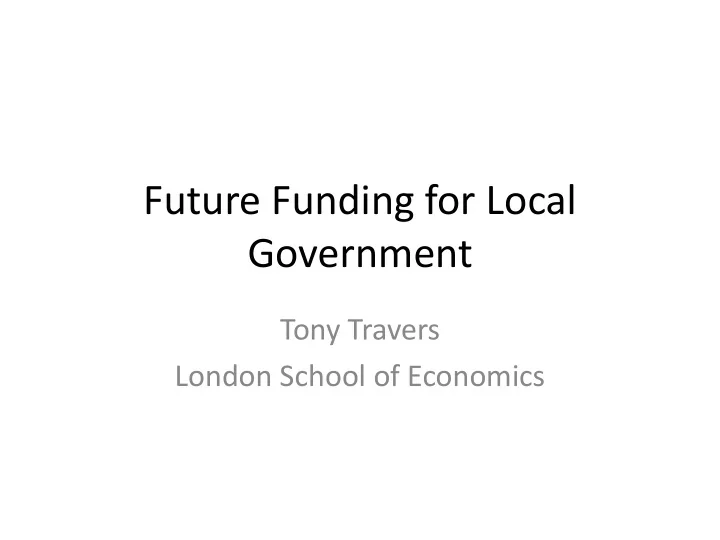

Future Funding for Local Government Tony Travers London School of Economics
The government’s key policy • Deficit reduction • Thus, a reduction in real terms public expenditure • Within that, protection for the NHS, schools, welfare and international development • And, latterly, capital spending • All other parts of public expenditure have been broadly ‘unprotected’ • Local government particularly affected
Local government’s challenge: current spending, by service group 140 120 100 Welfare 80 NHS 60 Schools Local Govt 40 20 0 2009-10 2010-11 2011-12 2012-13 2013-14 2014-15
Why can’t the South East use its growth to finance its need for services? • The South East has a GDP of £210bn pa • c£80-£85bn is raised in taxation • The economy has, in recent years, grown faster than the UK average • So, why doesn’t it raise the money to pay for its own services or infrastructure? • Because the UK is a uniquely centralised country where national government controls virtually all taxation and public expenditure
Sub-national taxation as a % of GDP
The London Finance Commission • Appointed by the Mayor of London • Commissioned research • Past reviews; Academic evidence about devolution; Scotland & Wales; International evidence, City Deal-type policies within England; London within the UK • Written and Oral evidence • Deliberation • Principles to guide proposals • Report: May 2013 • Follow-up consultations • Ministers, shadow ministers, civil servants, manifesto-writers, LCCI, London First etc
LFC Proposals • Modest proposals, but radical by UK standards • Devolution of all property taxes to London government – Council tax; NDR; Stamp Duty Land Tax; Capital Gains tax – Also, ‘draw - down’ list of minor revenues, local determination of charges/fees • Operation and tax-setting also to be devolved • Off-setting grant reductions on Day 1 – property taxes only….smaller taxes and charges would be additiona l • London would then keep 12% of all tax revenues as opposed to 4% at present – The South East would be very similar
What this would do – if implemented in the South East • Under the LFC proposals, the local tax-base would increase to three times its current size • This would give a powerful incentive for an area to grow its economy • If an area grew faster, the Exchequer would also gain – if it grew more slowly, the Exchequer would be protected • NB: the remaining 88% of taxation would remain within the Exchequer’s control • An area would then be able to fund a larger amount of local investment • This would grow in line with population growth
Something must be done • UK is remarkably centralised • Scotland and Wales to be given wide tax-raising powers – England nothing • Centralised public finance has not led to regional or territorial equality • Core Cities support LFC report • LFC proposals to be extended to other city regions • Issue of other regions, counties and district • Need to avoid ‘frightening’ the Treasury…. • The current arrangements undermine effective decisions about local priorities and investment
Future Funding for Local Government Tony Travers London School of Economics
Recommend
More recommend